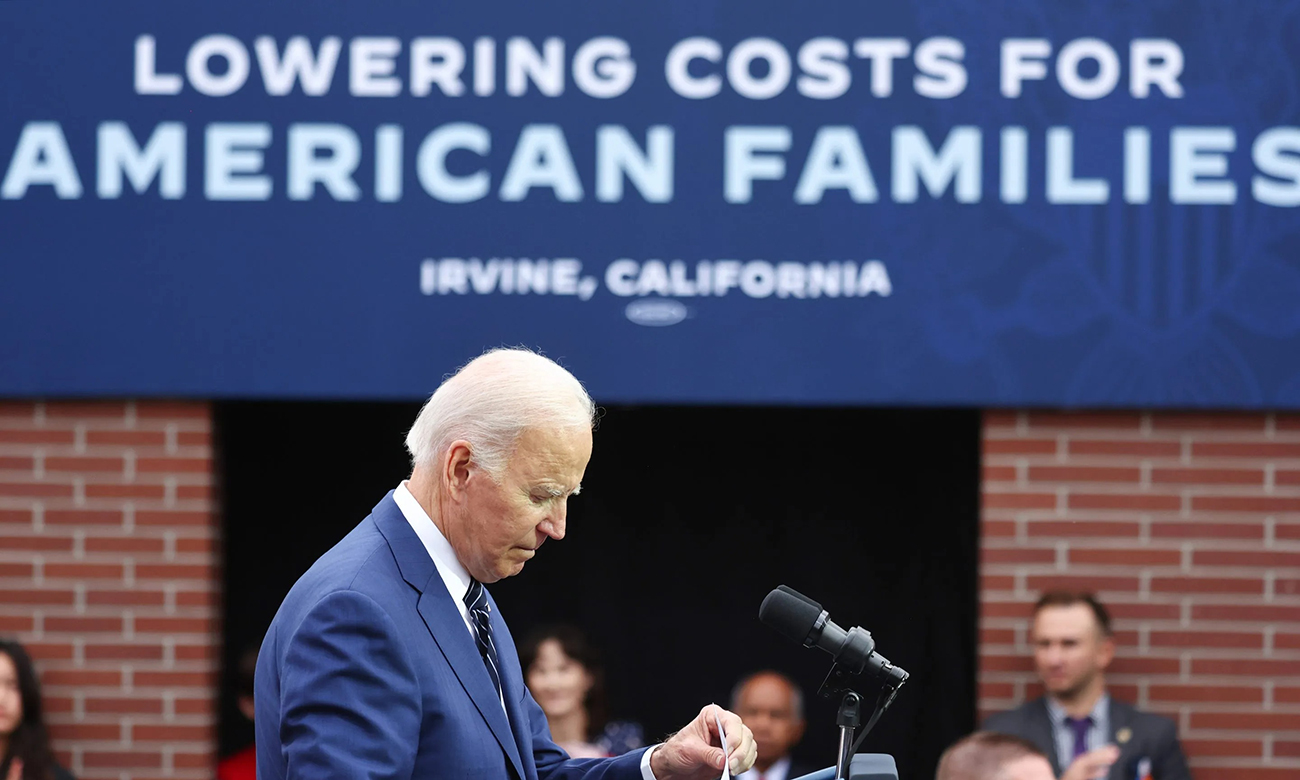
一年多以來,通貨膨脹都是美聯(lián)儲(Federal Reserve)和美國總統(tǒng)喬·拜登政府的眼中釘,,但美國銀行(Bank of America)的首席美國經(jīng)濟(jì)學(xué)家邁克爾·加彭表示,,物價高漲最嚴(yán)重的時候已經(jīng)結(jié)束。
加彭稱,,按照消費(fèi)者物價指數(shù)(CPI)衡量,,到2023年第四季度,年同比通脹率將下降到3.2%,。這與今年6月的9.1%和10月的7.7%相比有大幅下降,。
加彭在最近發(fā)表的一篇研究報告中寫道:“我們預(yù)測,在2023年,,隨著供應(yīng)鏈中斷問題進(jìn)一步緩解,、庫存恢復(fù)和勞動力市場狀況疲軟,,核心CPI通脹將快速下降?!?/p>
但不要過于激動,。加彭認(rèn)為,通脹下降的代價是“適度”經(jīng)濟(jì)衰退,,這意味著2023年的失業(yè)率將達(dá)到5.5%的最高點(diǎn),。今年10月的失業(yè)率為3.7%。
他寫道:“我們對美國經(jīng)濟(jì)適度衰退的前景預(yù)測,,主要依據(jù)是投資和消費(fèi)者支出疲軟,。我們認(rèn)為,勞動力市場疲軟,、更高的借貸成本,、更嚴(yán)格的信貸標(biāo)準(zhǔn)和更糟糕的資產(chǎn)負(fù)債狀況等不利因素,將導(dǎo)致消費(fèi)者減少支出,?!?/p>
除了加彭以外,還有其他華爾街經(jīng)濟(jì)學(xué)家認(rèn)為通貨膨脹已經(jīng)進(jìn)入了最后階段,,經(jīng)濟(jì)衰退即將發(fā)生,。
德意志銀行(Deutsche Bank)的首席經(jīng)濟(jì)學(xué)家戴維·福爾克茨-蘭道也認(rèn)為,美聯(lián)儲官員將“成功完成自己的使命”,,控制通貨膨脹,。他表示,到2023年年底,,CPI將回落到3.9%,,并認(rèn)為“中等程度”經(jīng)濟(jì)衰退將是美國人為穩(wěn)定物價必須付出的代價。
他在11月28日的一篇研究報告中寫道:“自去年春天以來的發(fā)展變化,,令我們對美國在2023年年中發(fā)生經(jīng)濟(jì)衰退的預(yù)期更有說服力,。”
雖然美聯(lián)儲今年六次加息,,而且美國總統(tǒng)拜登頒布了《通脹削減法案》(Inflation Reduction Act),,但通貨膨脹依舊是大多數(shù)美國人面臨的最迫切的問題。但大多數(shù)經(jīng)濟(jì)學(xué)家認(rèn)為,,通貨膨脹會下降,,并且不會引發(fā)嚴(yán)重衰退。
LPL Financial的首席經(jīng)濟(jì)學(xué)家杰弗里·羅奇以世界大型企業(yè)聯(lián)合會(Conference Board)于今年11月的消費(fèi)者信心調(diào)查結(jié)果為證據(jù),,證明經(jīng)濟(jì)衰退可能即將發(fā)生,。今年11月,美國消費(fèi)者信心降至四個月最低,,而通脹預(yù)期卻提高到7月以來的最高水平,。
羅奇對《財富》雜志表示:“信心下降的趨勢預(yù)示著2023年將會發(fā)生經(jīng)濟(jì)衰退,。”
但與加彭不同,,羅奇認(rèn)為,,由于勞動力市場緊張,任何經(jīng)濟(jì)衰退將是“短暫的且程度較淺”,。
當(dāng)然,,并非所有經(jīng)濟(jì)學(xué)家都認(rèn)同這種觀點(diǎn)。劍橋大學(xué)(University of Cambridge)皇后學(xué)院(Queens’ College)的院長,、太平洋投資管理公司(PIMCO)的前首席執(zhí)行官穆罕默德·埃爾-埃里安曾經(jīng)警告,,通貨膨脹可能“維持”在4%,并表示他有太多同行認(rèn)為美國經(jīng)濟(jì)最有可能的結(jié)果是發(fā)生“短暫且程度較淺的”經(jīng)濟(jì)衰退,。
埃爾-埃里安呼吁經(jīng)濟(jì)學(xué)家們在討論經(jīng)濟(jì)衰退的概率和潛在嚴(yán)重性時要有“更開放的心態(tài)”。
他在《金融時報》(Financial Times)上發(fā)表的專欄文章中寫道:“他們堅信經(jīng)濟(jì)衰退將是‘短暫的且程度較淺’,,并不斷鼓勵我們‘仔細(xì)研究’重大的變化,。我擔(dān)心這可能重復(fù)了去年糟糕的通貨膨脹預(yù)期中的分析和行為陷阱,我們至今仍然沒有擺脫它所造成的后果,?!保ㄘ敻恢形木W(wǎng))
譯者:劉進(jìn)龍
審校:汪皓
一年多以來,通貨膨脹都是美聯(lián)儲(Federal Reserve)和美國總統(tǒng)喬·拜登政府的眼中釘,,但美國銀行(Bank of America)的首席美國經(jīng)濟(jì)學(xué)家邁克爾·加彭表示,,物價高漲最嚴(yán)重的時候已經(jīng)結(jié)束。
加彭稱,,按照消費(fèi)者物價指數(shù)(CPI)衡量,,到2023年第四季度,年同比通脹率將下降到3.2%,。這與今年6月的9.1%和10月的7.7%相比有大幅下降,。
加彭在最近發(fā)表的一篇研究報告中寫道:“我們預(yù)測,在2023年,,隨著供應(yīng)鏈中斷問題進(jìn)一步緩解,、庫存恢復(fù)和勞動力市場狀況疲軟,核心CPI通脹將快速下降,?!?/p>
但不要過于激動。加彭認(rèn)為,,通脹下降的代價是“適度”經(jīng)濟(jì)衰退,,這意味著2023年的失業(yè)率將達(dá)到5.5%的最高點(diǎn)。今年10月的失業(yè)率為3.7%,。
他寫道:“我們對美國經(jīng)濟(jì)適度衰退的前景預(yù)測,,主要依據(jù)是投資和消費(fèi)者支出疲軟,。我們認(rèn)為,勞動力市場疲軟,、更高的借貸成本,、更嚴(yán)格的信貸標(biāo)準(zhǔn)和更糟糕的資產(chǎn)負(fù)債狀況等不利因素,將導(dǎo)致消費(fèi)者減少支出,?!?/p>
除了加彭以外,還有其他華爾街經(jīng)濟(jì)學(xué)家認(rèn)為通貨膨脹已經(jīng)進(jìn)入了最后階段,,經(jīng)濟(jì)衰退即將發(fā)生,。
德意志銀行(Deutsche Bank)的首席經(jīng)濟(jì)學(xué)家戴維·福爾克茨-蘭道也認(rèn)為,美聯(lián)儲官員將“成功完成自己的使命”,,控制通貨膨脹,。他表示,到2023年年底,,CPI將回落到3.9%,,并認(rèn)為“中等程度”經(jīng)濟(jì)衰退將是美國人為穩(wěn)定物價必須付出的代價。
他在11月28日的一篇研究報告中寫道:“自去年春天以來的發(fā)展變化,,令我們對美國在2023年年中發(fā)生經(jīng)濟(jì)衰退的預(yù)期更有說服力,。”
雖然美聯(lián)儲今年六次加息,,而且美國總統(tǒng)拜登頒布了《通脹削減法案》(Inflation Reduction Act),,但通貨膨脹依舊是大多數(shù)美國人面臨的最迫切的問題。但大多數(shù)經(jīng)濟(jì)學(xué)家認(rèn)為,,通貨膨脹會下降,,并且不會引發(fā)嚴(yán)重衰退。
LPL Financial的首席經(jīng)濟(jì)學(xué)家杰弗里·羅奇以世界大型企業(yè)聯(lián)合會(Conference Board)于今年11月的消費(fèi)者信心調(diào)查結(jié)果為證據(jù),,證明經(jīng)濟(jì)衰退可能即將發(fā)生,。今年11月,美國消費(fèi)者信心降至四個月最低,,而通脹預(yù)期卻提高到7月以來的最高水平,。
羅奇對《財富》雜志表示:“信心下降的趨勢預(yù)示著2023年將會發(fā)生經(jīng)濟(jì)衰退?!?/p>
但與加彭不同,,羅奇認(rèn)為,由于勞動力市場緊張,,任何經(jīng)濟(jì)衰退將是“短暫的且程度較淺”,。
當(dāng)然,并非所有經(jīng)濟(jì)學(xué)家都認(rèn)同這種觀點(diǎn)。劍橋大學(xué)(University of Cambridge)皇后學(xué)院(Queens’ College)的院長,、太平洋投資管理公司(PIMCO)的前首席執(zhí)行官穆罕默德·埃爾-埃里安曾經(jīng)警告,,通貨膨脹可能“維持”在4%,并表示他有太多同行認(rèn)為美國經(jīng)濟(jì)最有可能的結(jié)果是發(fā)生“短暫且程度較淺的”經(jīng)濟(jì)衰退,。
埃爾-埃里安呼吁經(jīng)濟(jì)學(xué)家們在討論經(jīng)濟(jì)衰退的概率和潛在嚴(yán)重性時要有“更開放的心態(tài)”,。
他在《金融時報》(Financial Times)上發(fā)表的專欄文章中寫道:“他們堅信經(jīng)濟(jì)衰退將是‘短暫的且程度較淺’,并不斷鼓勵我們‘仔細(xì)研究’重大的變化,。我擔(dān)心這可能重復(fù)了去年糟糕的通貨膨脹預(yù)期中的分析和行為陷阱,,我們至今仍然沒有擺脫它所造成的后果?!保ㄘ敻恢形木W(wǎng))
譯者:劉進(jìn)龍
審校:汪皓
Inflation has been a thorn in the side of the Federal Reserve and the Biden administration for more than a year, but Bank of America’s chief U.S. economist Michael Gapen says the worst of the price hikes are over.
Gapen argues that year-on-year inflation, as measured by the consumer price index (CPI), will sink to just 3.2% by the fourth quarter of next year. That’s quite the drop from June’s 9.1% peak, and October’s 7.7% figure.
“We expect core CPI inflation to moderate rapidly over the course of 2023 as supply-chain disruptions ease further, inventories recover, and labor market conditions weaken,” Gapen wrote in a recent research note.
But don’t get too excited. Gapen also believes that it will take a “mild” recession for inflation to fall, which means the unemployment rate will peak at 5.5% next year compared to 3.7% in October.
“Our outlook for a mild recession in the U.S. economy is driven by weaker investment and consumer spending,” he wrote. “We think the headwinds of a weaker labor market, higher borrowing costs, tighter credit standards, and weaker balance sheets will lead consumers to reduce spending.”
Gapen isn’t the only Wall Street economist arguing that inflation is on its last legs and a recession is coming.
Deutsche Bank chief economist David Folkerts-Landau also believes Fed officials will “succeed in their mission” of taming inflation. He sees CPI falling to 3.9% by the end of 2023 and argues a “moderate” recession will be the price Americans must pay for stable prices.
“Our expectation for a recession in the US by mid-2023 has strengthened on the back of developments since early last spring,” he wrote in a November 28 research note.
Despite the Fed’s six interest rate hikes this year, and President Biden’s Inflation Reduction Act, inflation continues to be the most pressing issue for a majority of Americans. But most economists believe it will fall without a severe recession.
Jeffrey Roach, LPL Financial’s chief economist, pointed to the Conference Board’s November consumer confidence survey as evidence that a recession could be on the way. U.S. consumer confidence declined to a four-month low in November, while inflation expectations rose to the highest level since July.
“The weakening trend in confidence foreshadows a recession which will likely happen in the coming year,” Roach told Fortune.
But like Gapen, Roach believes that any recession will be “short and shallow” due to the tight labor market.
Of course, not every economist agrees. Mohamed El-Erian, president of Queens’ College at the University of Cambridge and the former CEO of PIMCO, has warned that inflation could get “stuck” at 4% and argued that too many of his peers are convinced that a “short and shallow” recession is the most likely outcome for the U.S. economy.
El-Erian called on economists to be “more open-minded” when discussing the probability of a recession and its potential severity.
“[T]hey are confidently asserting that this recession will be ‘short and shallow’ and are encouraging us again to ‘look through’ a major development,” he wrote in a Financial Times?op-ed. “I worry that this could constitute a repeat of the analytical and behavioral traps that featured in last year’s ill-fated inflation call and whose consequences we are yet to put behind us.”






